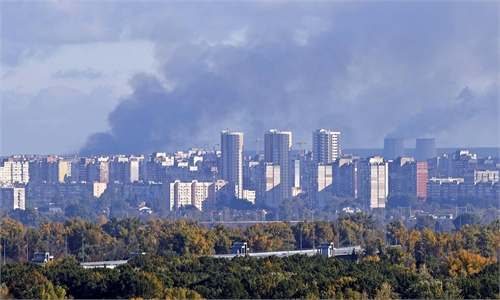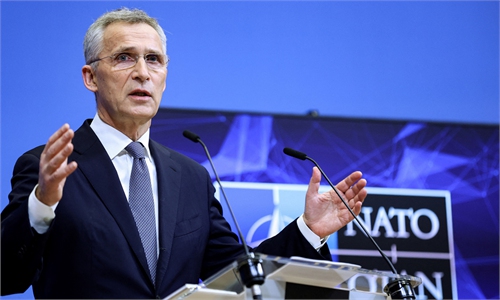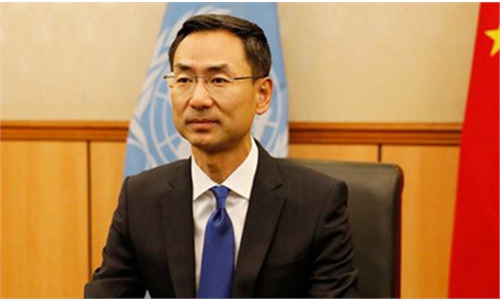NATO's nuclear talks, exercises seek to escalate Ukraine crisis, exhaust Moscow, Kiev: analysts

General view of a North Atlantic Council (NAC) session on deterrence and defense within NATO defense ministers meeting in Brussels, Belgium on October 13, 2022. Photo: VCG
As the international community closely watches the conflict between Russia and Ukraine with increasing worries over the use of nuclear weapons, NATO's secretive Nuclear Planning Group met on Thursday with the military pact planning to hold a nuclear exercise next week. Analysts said NATO's moves highlight the US' purpose of showing a tough stance to Russia, which would further pour oil onto the fire and fan the flames of the escalating Ukraine crisis.Defense ministers led the session, which usually takes place once or twice a year, at NATO headquarters in Brussels, the Associated Press reported. The meeting comes against a backdrop of high tension as some NATO allies supply Ukraine with advanced weapons and munitions to defend itself against Russian aerial attacks, the report noted.
On the sidelines of the Brussels meeting, a group of 13 NATO members and Finland, which is in the process of joining the alliance, has signed a letter of intent to procure air defense systems such as the Arrow 3 and Patriot. Ahead of the meeting, US Defense Secretary Lloyd Austin reaffirmed Washington's commitment to defend "every inch" of NATO territory, media reported on Thursday.
The Thursday meeting and sideline events came amid increasing worries as the Russia-Ukraine conflict seems to have gone from being a powder keg to a nuclear reactor due to certain forces that have been fanning war flames, analysts said.
Moreover, next week, 14 NATO member countries will take part in an exercise dubbed "Steadfast Noon," which will involve fighter jets capable of carrying nuclear warheads, but will not feature any live bombs. Conventional jets, and surveillance and refueling aircraft also routinely take part, AP reported.
NATO's nuclear exercise would include NATO members simulating defending against nuclear weapons and carrying out nuclear strikes on nuclear powers, which will escalate the current situation in Ukraine and push Russia to take similar exercises. It may also start a nuclear arms race between NATO and Russia and lead to greater nuclear intimidation between the two, Song Zhongping, a Chinese military expert and TV commentator, told the Global Times.
Song pointed out that there are several prerequisites for Russia to use nuclear weapons, including facing major challenges on national security or being attacked by nuclear weapons. If the US and NATO directly participate in the military conflict with Russia, the possibility of a nuclear war will increase.
NATO diplomats were cited by some Western media as saying that Russia is also due to hold its own nuclear exercises possibly at the same time as NATO or just after. These media also noted that Russian President Vladimir Putin has repeatedly signaled that he could resort to nuclear weapons to protect Russian gains.
NATO's moves, including conducting the nuclear exercises, actually reflect the US' stance - it wants to display its nuclear deterrent and place obstacles to any possible talks between EU leaders and Russia. Moreover, the Biden administration also sees "playing tough toward Russia" as one "achievement", and hopes this will help with the midterm elections, Cui Heng, an assistant researcher at the Center for Russian Studies at East China Normal University, told the Global Times.
Last week, US President Biden said the risk of nuclear "Armageddon" is the highest it has been for 60 years, when talking about the war. On Sunday, White House National Security Council spokesperson John Kirby walked back Biden's comment by saying a possible "Armageddon" wasn't an imminent threat, and that the US doesn't have "any indication" that Putin has made a decision to use nuclear weapons.
After Biden's remarks, in an interview with France 2 television on Wednesday, French President Emmanuel Macron warned about the responsibilities of leaders when it comes to nuclear rhetoric.
Despite the US' fanning flames, no country wants the current Russia-Ukraine conflict to escalate into a nuclear war, and hyping the nuclear threat from Russia will not help deescalate the situation as Russia is very unlikely to unleash its nuclear weapons, Cui noted.
Cui noted that the US wants the conflict to exhaust Russia and Europe, but EU leaders are becoming clearer that prolonging the conflict will only bring more harm to the EU, let alone a nuclear war that would have unbearable consequences for both the region and the world.
As the Ukraine-Russia conflict rages on, the flames of fighting are still spreading, and prospects for a peaceful settlement are not yet in sight, said Chinese Ambassador Geng Shuang at the UN General Assembly (UNGA) Emergency Special Session on Ukraine on Wednesday. He added that the most urgent thing now is to guide the parties concerned to exercise restraint, avoid escalation of conflicts, prevent the confrontation from getting out of control and deescalate the situation.



